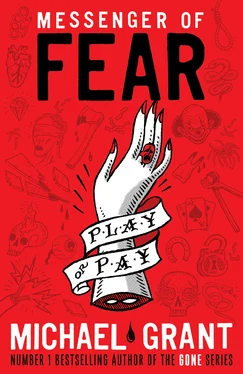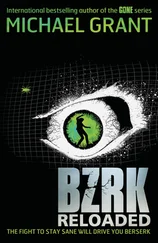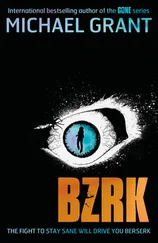Let her go, Oriax.
What did Messenger mean by that? How had she “had” me that she needed to let me go?
I recalled a sense of being released, and of that release filling me, however briefly, with a sense of loss but also a sense of relief. I had fallen when she released me, but she had never laid a finger on me.
Too much. Too much now crowded my brain. Too many feelings, too many wild emotions, too much fear, and . . . and something that was like fear but also held within it seeds of pleasure. I found that part of me wanted Oriax to come back. Even more of me wanted Messenger to speak to me, to explain, but also just to speak.
You’ll crave him desperately, oh yes, you will.
No, that at least would never be true. I had burned myself on that hot stove and did not need a second reminder that Messenger was not to be touched.
But did I still want him to explain? Did I want him to reveal? Yes.
“Why is my memory all fuzzy?” I asked him.
He considered me for a moment and reached some kind of decision. He drew a deep breath, and this simple biological act lessened my fear somewhat, for I had begun to believe my own blurted remark—that he was a demon, or if not a demon, then some other nameless supernatural horror.
Did demons breathe in that particularly weary way? Did sadness and loss reveal themselves in demons’ eyes?
I was confused. My feelings were all astray, rifled and tossed like a room that’s been burglarized. My memory, my emotions, all of it was too much, but I had already fainted once and would not allow myself to do so again. Whatever else this was, it was a test of my strength, my will. I would not be weak.
“Your memory has been disturbed by the transition.”
“Well, I need my memory.”
“Do you?” He tilted his head and looked at me as if my image was evoking something from another time and place. He wasn’t looking at me, Mara; he was looking at something I reminded him of.
“Look, Messenger,” I said, trying to sound determined, “I don’t know what you want of me, but I won’t cooperate unless I know who I am and . . .” I hesitated there, for the next words would perhaps reveal too much of the vulnerability I felt. Then, with a sigh that fluttered in my chest, I finished, “. . . and what I am.”
I swear that then he almost smiled. It was nothing that I could see, but the slight lessening in the rigidity of his features allowed me to think that he was possibly smiling.
“Yes. Memory,” he said.
And then, I remembered.
I saw what I looked like. I saw my face. My body. And with it, memories of earlier stages of my life. Me a year ago. Me three years ago. Me as a little girl taking gymnastics.
My locker combination was 13-36-9.
My grade point average was 4.0.
I was five feet, five inches tall and hoped against all odds to grow taller.
I weighed 121 pounds.
I knew my social security number.
I knew my student ID number.
I knew my driver’s license number, which surprised me because I didn’t think I’d ever memorized that.
It was as if every number I’d ever known was coming bubbling up into my brain. My home was at number 72. My birthday was July 26. My phone number . . .
“That’s not what matters,” I said.
“I thought you wanted to see your memories,” Messenger said.
“Those aren’t the memories. Those aren’t what I need. Did you do that to me? Can you turn my memory on and off?”
He surprised me by giving a direct answer. “Yes.”
“That’s not fair!” The words were out of my mouth before I’d even begun to think about them.
“Fair.” He said the word with something like reverence. Like the word had deep significance to him. “I’m sorry you find me unfair, but I think you are mistaken. You don’t yet understand, and whether it is fair or not in your judgment, I will hold your memories. I will hold them back.”
“What? Who says? I mean, what?”
“It’s part of the deal you made,” Messenger said.
I froze.
“What?”
He did not repeat himself. So I did.
“What? What do you mean, it’s the deal I made?”
“You must trust me, Mara.”
“Trust you? I don’t even know your name. I don’t even know what you are. I don’t know where we are or why. Trust you?”
“Yes, Mara. You must trust me.”
I stared at him, and this time I did not lower my eyes but met his gaze. “What is this about?” I asked.
He could have easily sidestepped such a poorly phrased question. But he did not. Instead he chose to answer, emphasis always on “chose” because though I didn’t yet know it, I was entirely in his power. At that moment, and for a long while after as well, I belonged to Messenger. I was his to control.
“This,” he said without the least drama or emphasis, “is about true and false. Right and wrong. Good and evil. And justice, Mara. This is about justice. And balance. And . . .” He nodded as if to himself rather than to me. “. . . and redemption.”
I said nothing. What is there to be said after such a speech?
He seemed vaguely amused that he had silenced me. And he took the opportunity to point a finger and invite my gaze to turn in the direction he indicated.
“It is also, at this moment, about Samantha Early.”
And there she was, Samantha Early, no longer at school but at her laptop computer in a Starbucks. She was chewing on her upper lip, concentrating, typing in stops and starts. Pause, then a sudden flurry. Pause, then a sudden flurry.
“What is she writing?” I asked.
“She’d already written it when she died,” Messenger said. “As to what she wrote, go and look.”
We were outside the Starbucks, looking in through the window. I went for the door, reached for it with my hand, and found that it seemed to slip away. I thought at first I had just missed, but a second attempt had the same result. On a third attempt I watched carefully and moved my hand slowly. I expected to see my hand pass in a ghostly way through the solid object. And what does it reveal about my state of mind that I expected that?
But rather than my insubstantial hand passing through a solid object, it was the door handle that moved. It was there, and then, an instant before my fingers would have touched it, it was gone. And the moment I withdrew my hand, it was back.
“You cannot alter what you see around you,” Messenger instructed. “You may see all but touch nothing. What you see is all past, and the past may not be changed.”
“How do I see what she’s writing if I can’t open the stupid door?” I said. I was annoyed by the door, irrationally annoyed. It was strange to be irritated by something so small in these wanderings with a strange boy through an impossible universe. But maybe it was easier or safer to be bothered by things that seemed familiar.
The deal I made.
Did I even want to know how I had come to make a deal with Messenger? And why had he said that I may see but not touch? Why may and not can ? That word choice hinted at rules, and rules come from a person or institution.
“I need time,” I said. “I need to . . . to rest.” If I could just sit down somewhere, digest, put things together. Think.
“It’s a lot to understand,” Messenger allowed. “But the understanding will only come by living it.”
“Or you could explain it,” I snapped.
“Do you want to know what Samantha Early is writing?”
I have a fatal weakness: I am the cat curiosity killed. “Yes, of course I want to know. The girl is going to kill herself. Maybe her writing will tell us why.”
“Then see,” Messenger said.
It was a challenge. Or a test. He wanted to know whether I could find a way into the coffee shop.
Читать дальше












